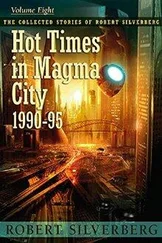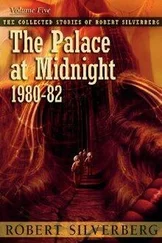Robert Silverberg - How it Was When the Past Went Away
Здесь есть возможность читать онлайн «Robert Silverberg - How it Was When the Past Went Away» весь текст электронной книги совершенно бесплатно (целиком полную версию без сокращений). В некоторых случаях можно слушать аудио, скачать через торрент в формате fb2 и присутствует краткое содержание. Год выпуска: 2007, ISBN: 2007, Издательство: Subterranean Press, Жанр: Фантастика и фэнтези, на английском языке. Описание произведения, (предисловие) а так же отзывы посетителей доступны на портале библиотеки ЛибКат.
- Название:How it Was When the Past Went Away
- Автор:
- Издательство:Subterranean Press
- Жанр:
- Год:2007
- ISBN:978-1-59606-089-0
- Рейтинг книги:4 / 5. Голосов: 1
-
Избранное:Добавить в избранное
- Отзывы:
-
Ваша оценка:
- 80
- 1
- 2
- 3
- 4
- 5
How it Was When the Past Went Away: краткое содержание, описание и аннотация
Предлагаем к чтению аннотацию, описание, краткое содержание или предисловие (зависит от того, что написал сам автор книги «How it Was When the Past Went Away»). Если вы не нашли необходимую информацию о книге — напишите в комментариях, мы постараемся отыскать её.
How it Was When the Past Went Away — читать онлайн бесплатно полную книгу (весь текст) целиком
Ниже представлен текст книги, разбитый по страницам. Система сохранения места последней прочитанной страницы, позволяет с удобством читать онлайн бесплатно книгу «How it Was When the Past Went Away», без необходимости каждый раз заново искать на чём Вы остановились. Поставьте закладку, и сможете в любой момент перейти на страницу, на которой закончили чтение.
Интервал:
Закладка:
“It was eleven years ago,” Dr. Bryce told him. “Won’t you let go of it?”
“Stupid talk coming from a shrink. Why won’t it let go of me?”
“You don’t want it to. You’re too fond of playing your role.”
“Today is talking-tough day, eh? Get me some more water.”
“Get up and get it yourself,” said the shrink.
Haldersen smiled bitterly. He left the bed, crossing the room a little unsteadily, and filled his glass. He had had all sorts of therapy—sympathy therapy, antagonism therapy, drugs, shock, orthodox freuding, the works. They did nothing for him. He was left with the image of an opening pod; and falling figures against the iron-blue sky. The Lord gave, and the Lord hath taken away; blessed be the name of the Lord. My soul is weary of my life. He put the glass to his lips. Eleven years. I missed the plane. I sinned with Marie, and Emily died, and John, and Beth. What did it feel like to fall so far? Was it like flying? Was there ecstasy in it? Haldersen filled the glass again.
“Thirsty today, eh?”
“Yes,” Haldersen said.
“Sure you don’t want to take a little walk?”
“You know I don’t.’ Haldersen shivered. He turned and caught the psychiatrist by the forearm. “When does it end, Tim? How long do I have to carry this thing around?”
“Until you’re willing to put it down.”
“How can I make a conscious effort to forget something? Tim, Tim, isn’t there some drug I can take, something to wash away a memory that’s killing me?”
“Nothing effective.”
“You’re lying,” Haldersen murmured. “I’ve read about the amnesifacients. The enzymes that eat memory-RNA. The experiments with diisopropyl fluorophosphate. Puromycin. The—”
Dr. Bryce said, “We have no control over their operations. We can’t simply go after a single block of traumatic memories while leaving the rest of your mind unharmed. We’d have to bash about at random, hoping we got the trouble spot, but never knowing what else we were blotting out. You’d wake up without your trauma, but maybe without remembering anything else that happened to you between, say, the age of fourteen and forty. Maybe in fifty years we’ll know enough to be able to direct the dosage at a specific—”
“I can’t wait fifty years.”
“I’m sorry, Nate.”
“Give me the drug anyway. I’ll take my chances on what I lose.”
“We’ll talk about that some other time, all right? The drugs are experimental. There’d be months of red tape before I could get authorization to try them on a human subject. You have to realize—”
Haldersen turned him off. He saw only with his inner eye, saw the tumbling bodies, reliving his bereavement for the billionth time, slipping easily back into his self-assumed role of Job. I am a brother to dragons, and a companion to owls. My skin is black upon me, and my bones are burned with heat. He hath destroyed me on every side, and I am gone: and mine hope hath he removed like a tree.
The shrink continued to speak. Haldersen continued not to listen. He poured himself one more glass of water with a shaky hand.
It was close to midnight on Wednesday before Pierre Gerard, his wife, their two sons and their daughter had a chance to have dinner. They were the proprietors, chefs, and total staff of the Petit Pois restaurant on Sansome Street, and business had been extraordinary, exhaustingly good all evening. Usually they were able to eat about half past five, before the dinner rush began, but today people had begun coming in early—made more expansive by the good weather, no doubt—and there hadn’t been a free moment for anybody since the cocktail hour. The Gerards were accustomed to brisk trade, for theirs was perhaps the most popular family-run bistro in the city, with a passionately devoted clientele. Still, a night like this was too much!
They dined modestly on the evening’s miscalculations: an overdone rack of lamb, some faintly corky Château Beychevelle ‘97, a fallen soufflé, and such. They were thrifty people. Their one extravagance was the Evian water that they imported from France. Pierre Gerard had not set foot in his native Lyons for thirty years, but he preserved many of the customs of the motherland, including the traditional attitude toward water. A Frenchman does not drink much water, but what he does drink comes always from the bottle, never from the tap. To do otherwise is to risk a diseased liver. One must guard one’s liver.
That night Freddy Munson picked up Helene at her flat on Geary and drove across the bridge to Sausalito for dinner, as usual, at Ondine’s. Ondine’s was one of only four restaurants, all of them famous old ones, at which Munson ate in fixed rotation. He was a man of firm habits. He awakened religiously at six each morning, and was at his desk in the brokerage house by seven, plugging himself into the data channels to learn what had happened in the European finance markets while he slept. At half past seven local time the New York exchanges opened and the real day’s work began. By half past eleven, New York was through for the day, and Munson went around the corner for lunch, always at the Petit Pois, whose proprietor he had helped to make a millionaire by putting him into Consolidated Nucleonics’ several components two and a half years before the big merger. At half past one, Munson was back in the office to transact business for his own account on the Pacific Coast exchange; three days a week he left at three, but on Tuesdays and Thursdays he stayed as late as five in order to catch some deals on the Honolulu and Tokyo exchanges. Afterwards, dinner, a play or concert, always a handsome female companion. He tried to get to sleep, or at least to bed, by midnight.
A man in Freddy Munson’s position had to be orderly. At any given time, his thefts from his clients ranged from six to nine million dollars, and he kept all the details of his jugglings in his head. He couldn’t trust putting them on paper because there were scanner eyes everywhere; and he certainly didn’t dare employ the data net, since it was well known that anything you confided to one computer was bound to be accessible to some other computer somewhere, no matter how tight a privacy seal you slapped on it. So Munson had to remember the intricacies of fifty or more illicit transactions, a constantly changing chain of embezzlements, and a man who practices such necessary disciplines of memory soon gets into the habit of extending discipline to every phase of his life.
Helene snuggled close. Her faintly psychedelic perfume drifted toward his nostrils. He locked the car into the Sausalito circuit and leaned back comfortably as the traffic-control computer took over the steering. Helene said, “At the Bryce place last night I saw two sculptures by your bankrupt friend.”
“Paul Mueller?”
“That’s the one. They were very good sculptures. One of them buzzed at me.”
“What were you doing at the Bryce’s?”
“I went to college with Lisa Bryce. She invited me over with Marty.”
“I didn’t realize you were that old,” Munson said.
Helene giggled. “Lisa’s a lot younger than her husband, dear. How much does a Paul Mueller sculpture cost?”
“Fifteen, twenty thousand, generally. More for specials.”
“And he’s broke, even so?”
“Paul has a rare talent for self-destruction,” Munson said. “He simply doesn’t comprehend money. But it’s his artistic salvation, in a way. The more desperately in debt he is, the finer his work becomes. He creates out of his despair, so to speak. Though he seems to have overdone the latest crisis. He’s stopped working altogether. It’s a sin against humanity when an artist doesn’t work.”
“You can be so eloquent, Freddy,” Helene said softly.
Читать дальшеИнтервал:
Закладка:
Похожие книги на «How it Was When the Past Went Away»
Представляем Вашему вниманию похожие книги на «How it Was When the Past Went Away» списком для выбора. Мы отобрали схожую по названию и смыслу литературу в надежде предоставить читателям больше вариантов отыскать новые, интересные, ещё непрочитанные произведения.
Обсуждение, отзывы о книге «How it Was When the Past Went Away» и просто собственные мнения читателей. Оставьте ваши комментарии, напишите, что Вы думаете о произведении, его смысле или главных героях. Укажите что конкретно понравилось, а что нет, и почему Вы так считаете.












